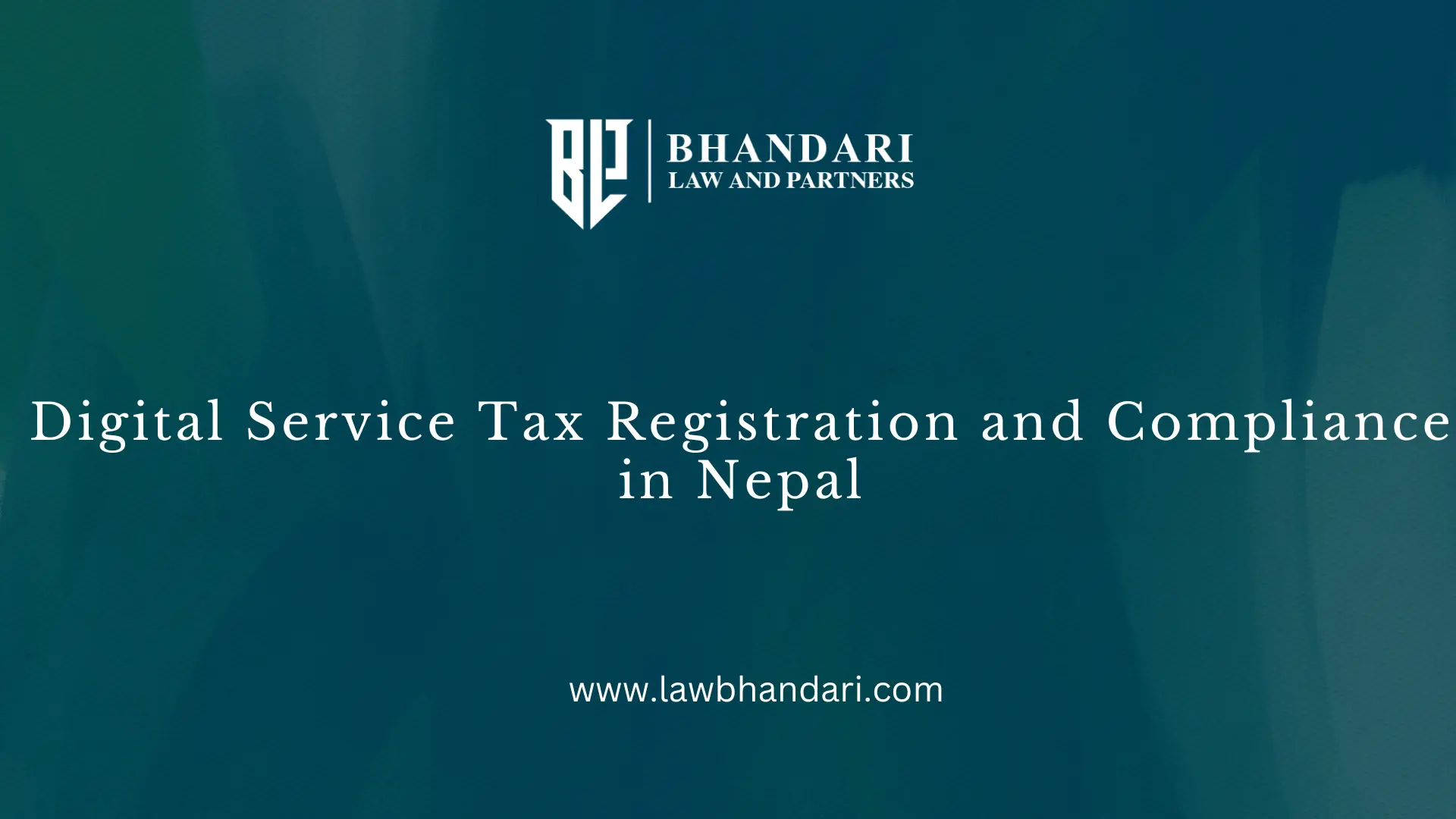Table of content
-

Digital Service Tax Registration and Compliance in Nepal
01. Background
This article provides an overview of Nepal’s Digital Service Tax (“DST”), detailing its legal framework, scope, compliance obligations, and procedural requirements for non-resident digital service providers. It covers the key aspects of the DST system, reflecting the latest legal updates as of April 22, 2025, and offers readers a clear understanding of the Digital Service Tax in Nepal.
02. Introduction
Nepal introduced the Digital Service Tax through the Procedure Related to Digital Service Tax (hereinafter referred to as the "DST Procedure") in the fiscal year 2022 A.D. (2078 B.S). The procedure was first amended in 2024 A.D (2080 B.S.), with the most recent version promulgated in 2025 A.D. (2081 B.S.), pursuant to Section 16 of the Finance Act, 2024 A.D. (2081 B.S.) This DST was developed to address the tax implications arising from digital services offered by non-resident entities to Nepali consumers.
03. Governing Law
The governing law for regulation of Digital Service Tax are:
a. Finance Act 2081 (2023/24)
b. Procedure Related to Digital Service Tax 2024 (2081)
Note: The Finance Act is passed by the Government of Nepal every year, and any changes related to Digital Service Tax should be reviewed for each fiscal year.
04. Governing Authority
The Large Taxpayer Office (LTO) oversees the registration, regulation, de-registration, and collection of Digital Service Tax.
05. Scope of Digital Service
The DST Procedure defines “digital services” as services delivered through information technology, involving minimal human intervention, and provided electronically over the Internet.
These include, but are not limited to, advertising services, cinema, television, music and over-the-top (OTT) content platforms, subscription-based services, data hosting and cloud services, gaming, mobile applications, digital marketplaces, software supply and updates, downloads of statistics and images, digital consultancy, skill development and training services, e-books, e-journals, and similar services.
Digital services provided to consumers of Nepal is deemed to be provided to a consumer in Nepal if any of the following criteria are fulfilled:
a. The service is received within Nepal;
b. The invoice is issued to an address located in Nepal;
c. The payment is made through banks or authorized payment service providers operating in Nepal;
d. The payment is made using credit, debit, or similar cards issued in Nepal;
e. The service is accessed through an IP address located in Nepal;
f. The service is delivered through cash on delivery within Nepal.
Furthermore, as per Value Added Tax Act, 2052 (1996) - Section 2(Da1) “Nonresident person” means a person residing outside Nepal having no permanent business address, a business representative or a legally recognized representative in Nepal."
06. Registration Procedure
Non-resident persons liable for DST must register in Nepal and obtain a Permanent Account Number (PAN) within thirty days of exceeding the NPR 3 million threshold. Entities already registered for VAT are not required to obtain a separate PAN.
Registration must be completed through an online portal operated by the Large Taxpayer Office (LTO), accompanied by the following documentation:
a. Notarized copies of the company’s registration and tax documents in English from the home jurisdiction;
b. Letter of authorization and notarized copy of the passport of the authorized representative (if applicable);
c. Photographic identification and signature specimen of the authorized person.
The Large Taxpayer Office is mandated to issue the DST registration certificate within seven working days upon submission of a complete application.
07. Basis and Rate of Digital Service Tax
Digital services are subject to DST when provided by non-resident entities to consumers defined as individuals residing in Nepal who utilize the service for personal rather than business purposes. Business-to-business (B2B) transactions fall outside the purview of DST Procedure and are instead governed by the Income Tax Act.
DST is imposed on non-resident entities providing digital services to Nepali consumers where the total value of services exceeds NPR 3 million within a fiscal year. The applicable tax rate is 2% on the transaction value, exclusive of indirect taxes such as VAT. The DST is a direct tax and, by statute, may not be transferred to the consumer.
Transactions subject to DST are exempt from income tax under the Income Tax Act. However, if the service recipient does not qualify as a consumer under the DST Procedure, income tax obligations under the Income Tax Act become applicable.
08. Audit and Penalties
The transactions must be recorded using the accrual accounting method and denominated in Nepali Rupees (NPR). E-invoicing is permitted without the need for prior approval from the Inland Revenue Department. The currency conversion must be based on the official exchange rate published by Nepal Rastra Bank on the date of transaction.
Tax payments must be made within 3 months from the close of the fiscal year. Late payments attract interest at the rate of 15% per annum on the outstanding amount. DST returns must be filed electronically through the LTO portal within three months from the end of the Nepali fiscal year (Mid-July to August). Late filing incurs a penalty of 0.1% of the annual transaction amount per annum.
The Inland Revenue Department holds the authority to audit digital service transactions conducted by non-resident service providers. Where underreporting or concealment of tax liability is identified, a penalty of 50% of the understated amount may be imposed.
09. De-registration
Non-resident service providers who cease to operate or provide services to Nepali consumers are required to submit a formal deregistration request to the Large Taxpayer Office (LTO). The LTO is obligated to respond with either confirmation or a justified refusal within three months of submission.
Related Professionals:
Frequently Asked Question
For quick legal assistance:
You can directly call to our legal expert: +977-9808811027
Even can call or drop a text through What’s app , Viber, Telegram and We Chat at the same number.
Also can do email on : info@lawbhandari.com
contact us
Phone :,
,Connect with our professional lawyers in Nepal :
Follow Our Law Firm on Social Media :